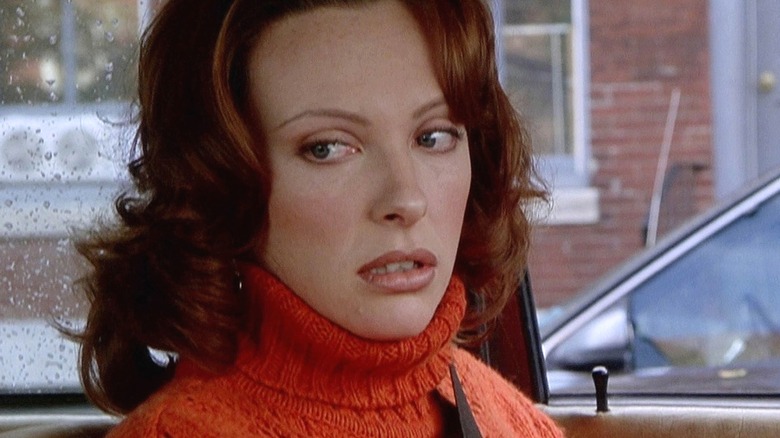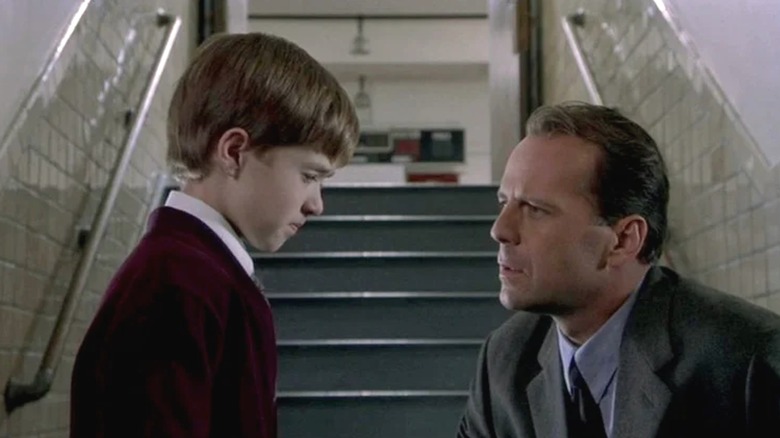Why Toni Collette Had No Clue The Sixth Sense Was A Horror Movie While Shooting It
M. Night Shyamalan's "The Sixth Sense" needs no introduction. The psychological horror, which was released during the summer of 1999, became something of a sleeper hit while cementing Shyamalan's strengths as a director with an intuitive bent for surprise twists. "The Sixth Sense" uses gradually escalating dread to build its central tragedy, and knowing its big twist in advance doesn't detract from the experience. If anything, it adds thematic layers to the plight of the troubled Cole (Haley Joel Osment), while highlighting the unique anxieties of life during the cusp of the millennium.
Toni Collette's nuanced performance as Cole's mother, Lynn Sear, earned her a Best Supporting Actress nomination at the Academy Awards, where horror awards are rarely recognized. Yet Collette wasn't actually aware that "The Sixth Sense" was a horror movie during the time of filming. In an interview for the radio show Q with Tom Power, she explained that her initial understanding was that Shyamalan's film was a "spiritual" drama, and that the horror aspect of the narrative only dawned on her when she saw it being pieced together:
"I haven't done that many [horror movies]. It's only a handful, and I don't like to watch them. But being in them is very different [...] I just thought ['The Sixth Sense'] was a beautiful spiritual story. I remember walking past a makeshift edit suite on set [...] And they were cutting the scene together where Hayley is at that girl's house, played by Mischa Barton [who plays the ghost of Kyra Collins]. And he walks past the bed, and she reaches out and grabs him. And the way it was shot, I was like, 'Oh, holy sh**. I think this is a horror movie!' [Laughs]."
The Sixth Sense is much more than a ghost story
While Collette's anecdote is chuckle-worthy, it is not far-fetched to frame "The Sixth Sense" as a spiritual story about death, suffering, and our inherent inability to communicate. "If we can't talk to each other, we're not gonna make it," Lynn gently tells Cole, as she can sense the growing divide that is preventing her from understanding his predicament. There is no grudge or ill will here, of course, but a general inability to lay one's soul bare. Cole's pain stems from his power to communicate with spirits, but this gift doesn't always translate to the living. While Malcom attempts to help the child overcome this hurdle, the full scope of the truth proves to be too harrowing by the end.
In the abovementioned interview, Collette talks about the beauty inherent in such a layered exploration of emotions, which is also the case with Ari Aster's "Hereditary," a story as heartbreaking as it is terrifying:
"The horror films that I've done are actually just like beautiful dramas that have an element that pushes people just a little bit further. Like 'Hereditary' is just a heartbreaking story about family grief and disconnection."
While "Hereditary" explores the darkest aspects of familial bonds through a quasi-fantastical lens, "The Sixth Sense" uses Cole's communication with spirits to convey the wondrous and terrifying extremes of childhood. In Cole's case, seeing things nobody else can is a burden, and he often witnesses horrific aspects of life that no child should be exposed to. Can such a curse be channeled into a gift if Cole bravely helps those nobody else can? The answer is a hope-tinged yes, which is the quiet promise of Shyamalan's "The Sixth Sense."

